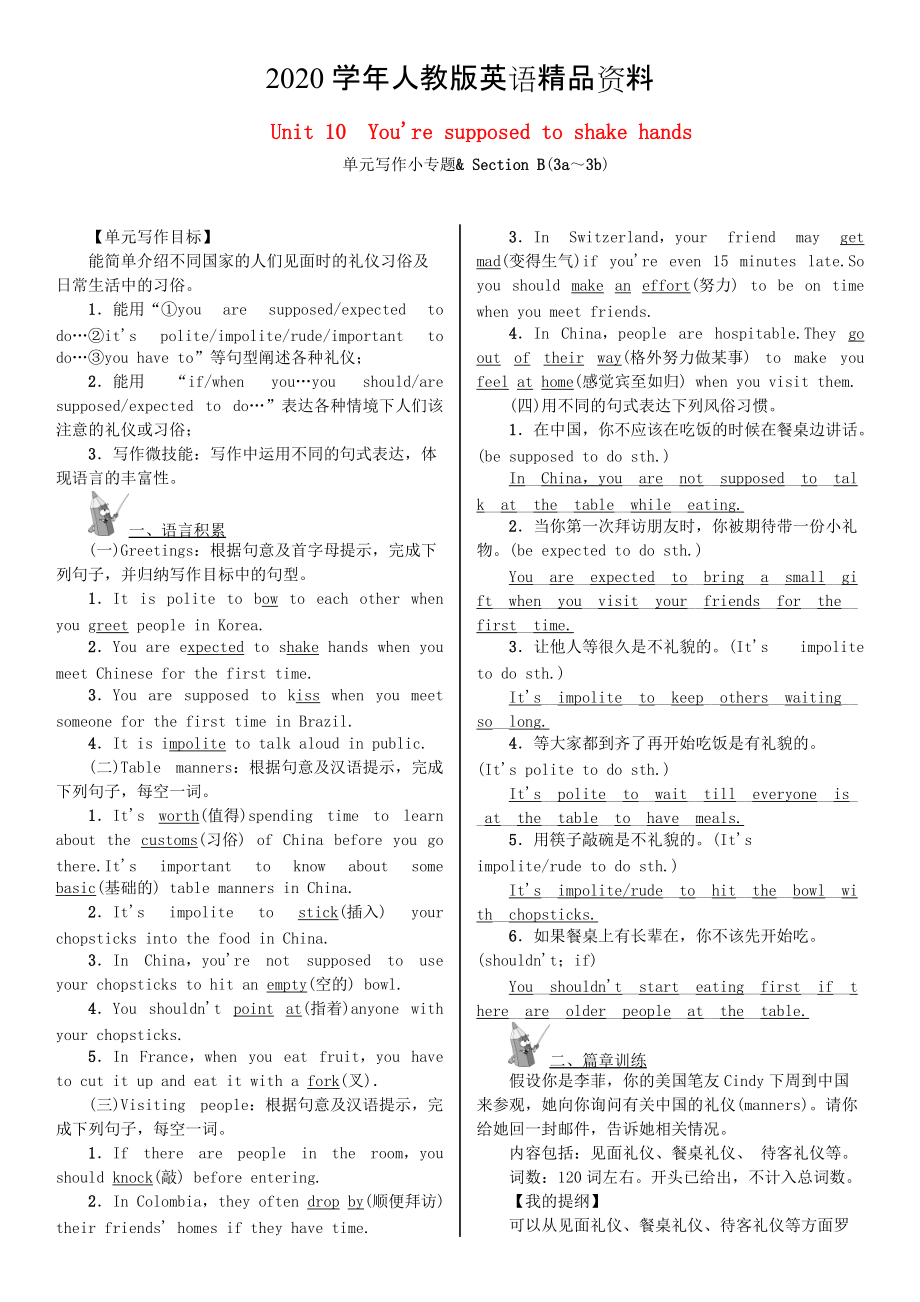《2020浙江專(zhuān)版九年級(jí)英語(yǔ)全冊(cè) Unit 10 You’re supposed to shake hands寫(xiě)作小專(zhuān)題習(xí)題 人教新目標(biāo)版》由會(huì)員分享����,可在線(xiàn)閱讀,更多相關(guān)《2020浙江專(zhuān)版九年級(jí)英語(yǔ)全冊(cè) Unit 10 You’re supposed to shake hands寫(xiě)作小專(zhuān)題習(xí)題 人教新目標(biāo)版(2頁(yè)珍藏版)》請(qǐng)?jiān)谘b配圖網(wǎng)上搜索��。
1�、2020學(xué)年人教版英語(yǔ)精品資料
Unit 10 You're supposed to shake hands
單元寫(xiě)作小專(zhuān)題& Section B(3a~3b)
【單元寫(xiě)作目標(biāo)】
能簡(jiǎn)單介紹不同國(guó)家的人們見(jiàn)面時(shí)的禮儀習(xí)俗及日常生活中的習(xí)俗。
1.能用“①you are supposed/expected to do…②it's polite/impolite/rude/important to do…③you have to”等句型闡述各種禮儀�;
2.能用 “if/when you…you should/are suppos
2、ed/expected to do…”表達(dá)各種情境下人們?cè)撟⒁獾亩Y儀或習(xí)俗�;
3.寫(xiě)作微技能:寫(xiě)作中運(yùn)用不同的句式表達(dá),體現(xiàn)語(yǔ)言的豐富性�。
一、語(yǔ)言積累
(一)Greetings:根據(jù)句意及首字母提示��,完成下列句子�����,并歸納寫(xiě)作目標(biāo)中的句型����。
1.It is polite to bow to each other when you greet people in Korea.
2.You are expected to shake hands when you meet Chinese for the first time.
3.You are supposed to kiss wh
3�、en you meet someone for the first time in Brazil.
4.It is impolite to talk aloud in public.
(二)Table manners:根據(jù)句意及漢語(yǔ)提示��,完成下列句子����,每空一詞。
1.It's worth(值得)spending time to learn about the customs(習(xí)俗) of China before you go there.It's important to know about some basic(基礎(chǔ)的) table manners in China
4���、.
2.It's impolite to stick(插入) your chopsticks into the food in China.
3.In China�����,you're not supposed to use your chopsticks to hit an empty(空的) bowl.
4.You shouldn't point at(指著)anyone with your chopsticks.
5.In France����,when you eat fruit����,you have to cut it up and eat it with a fork(
5、叉).
(三)Visiting people:根據(jù)句意及漢語(yǔ)提示��,完成下列句子����,每空一詞�。
1.If there are people in the room�����,you should knock(敲) before entering.
2.In Colombia�����,they often drop by(順便拜訪(fǎng)) their friends' homes if they have time.
3.In Switzerland�,your friend may get mad(變得生氣)if you're even 15 minutes late.So you should m
6��、ake an effort(努力) to be on time when you meet friends.
4.In China����,people are hospitable.They go out of their way(格外努力做某事) to make you feel at home(感覺(jué)賓至如歸) when you visit them.
(四)用不同的句式表達(dá)下列風(fēng)俗習(xí)慣。
1.在中國(guó)�����,你不應(yīng)該在吃飯的時(shí)候在餐桌邊講話(huà)�。(be supposed to do sth.)
In__China,you__are__not__supposed__to__talk__at__the_
7����、_table__while__eating.
2.當(dāng)你第一次拜訪(fǎng)朋友時(shí)�����,你被期待帶一份小禮物����。(be expected to do sth.)
You__are__expected__to__bring__a__small__gift__when__you__visit__your__friends__for__the__first__time.
3.讓他人等很久是不禮貌的��。(It's impolite to do sth.)
It's__impolite__to__keep__others__waiting__so__long.
4.等大家都到齊了再開(kāi)始吃飯是有禮貌
8����、的。(It's polite to do sth.)
It's__polite__to__wait__till__everyone__is__at__the__table__to__have__meals.
5.用筷子敲碗是不禮貌的��。(It's impolite/rude to do sth.)
It's__impolite/rude__to__hit__the__bowl__with__chopsticks.
6.如果餐桌上有長(zhǎng)輩在��,你不該先開(kāi)始吃�。(shouldn't;if)
You__shouldn't__start__eatin
9��、g__first__if__there__are__older__people__at__the__table.
二����、篇章訓(xùn)練
假設(shè)你是李菲,你的美國(guó)筆友Cindy下周到中國(guó)來(lái)參觀(guān),她向你詢(xún)問(wèn)有關(guān)中國(guó)的禮儀(manners)����。請(qǐng)你給她回一封郵件,告訴她相關(guān)情況�����。
內(nèi)容包括:見(jiàn)面禮儀��、餐桌禮儀�����、 待客禮儀等��。
詞數(shù):120詞左右��。開(kāi)頭已給出��,不計(jì)入總詞數(shù)��。
【我的提綱】
可以從見(jiàn)面禮儀����、餐桌禮儀�����、待客禮儀等方面羅列你要寫(xiě)的中國(guó)禮儀。
Dear Cindy���,
You must be excited about coming to China soon.It is helpful t
10�����、o learn as many of the customs in China as possible.These basic manners will help you enjoy staying in China.
First__of__all����,let__me__give__you__some__suggestions__about__visiting__the__Chinese__people.When__you__meet__the__Chinese__people__for__the__first__time���,you__are__supposed__to__shake__hands
11�、.You__shouldn't__kiss__them.It's__polite__to__smile__and__say__hello__to__them.You__should__knock__on__the__door__before__entering__the__room.And__it's__rude__to__leave__without__saying__goodbye.You__are__expected__to__bring__a__small__gift__if__you__visit__your__friend__for__the__first_
12����、_time.It's__polite__to__do__so.And__it's__polite__to__call__first__if__you__want__to__visit__your__friend.
Then,it__is__helpful__to__learn__as__many__of__the__table__manners__as__possible.It's__polite__to__wait__till__everyone__is__at__the__table.And__you__are__not__supposed__to__use__y
13��、our__chopsticks__to__hit__an__empty__bowl.You__shouldn't__stick__the__chopsticks__into__the__food.It's__very__impolite__to__point__at__others__with__your__chopsticks.It__is__also__rude__to__speak__with__your__mouth__full__of__food.If__you__know__the__manners�,I__think__you'll__enjoy__yourself__in__China.
When__you__go__to__China,you__had__better__remember__the__famous__saying:When__in__Rome,do__as__the__Romans__do.Best__wishes!
Yours�����,
Li__Fei
 2020浙江專(zhuān)版九年級(jí)英語(yǔ)全冊(cè) Unit 10 You’re supposed to shake hands寫(xiě)作小專(zhuān)題習(xí)題 人教新目標(biāo)版
2020浙江專(zhuān)版九年級(jí)英語(yǔ)全冊(cè) Unit 10 You’re supposed to shake hands寫(xiě)作小專(zhuān)題習(xí)題 人教新目標(biāo)版

